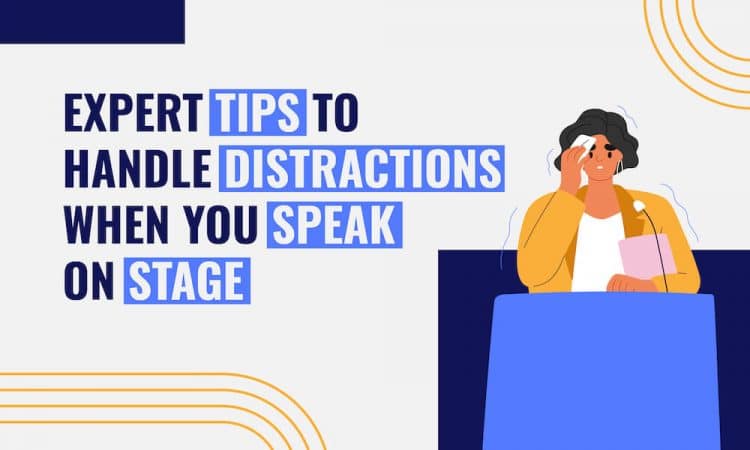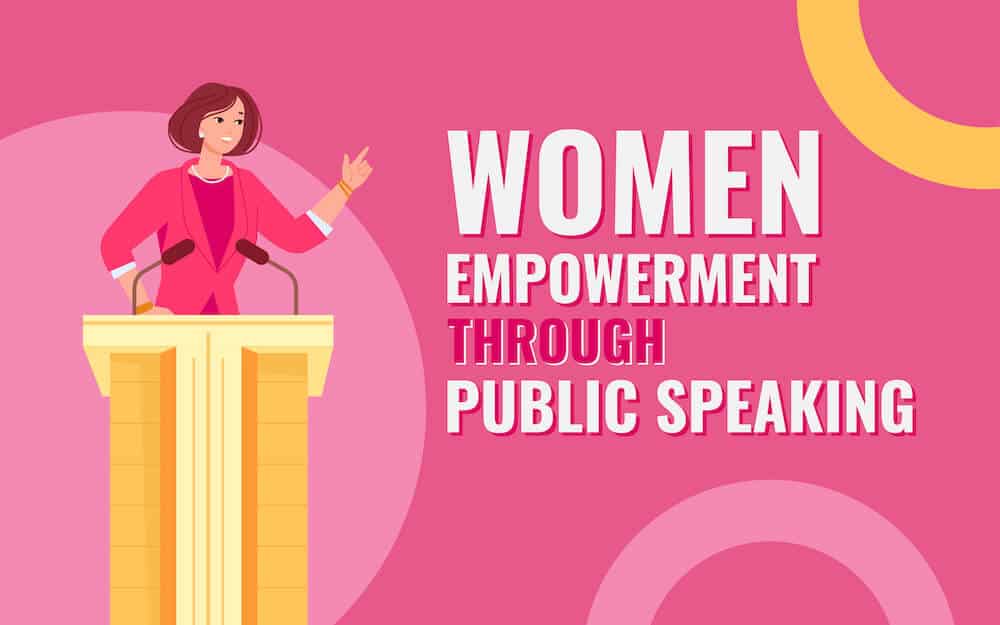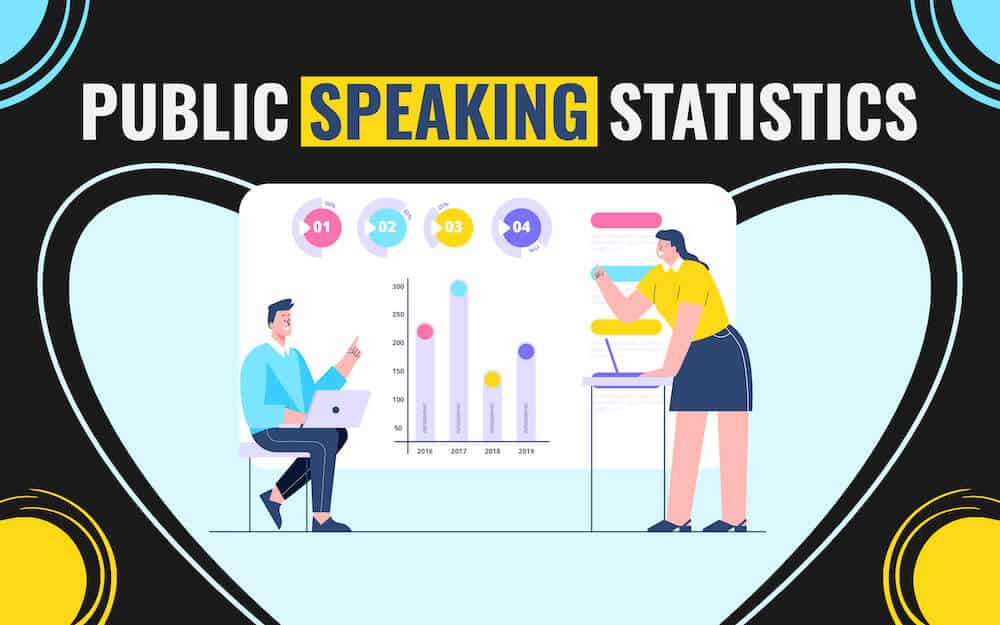
Distractions can be many. Some you can avert, and others can be entirely unforeseen. The ones you can’t know beforehand run the risk of putting you in a spot during the speech. For instance, someone’s phone rings, equipment malfunctions, your skin starts itching, or you have a troller in the front seat.
You could be perfectly prepared for your speech and yet face these roadblocks when you least expect them. Preparing in advance will equip you to get out as graciously and quickly as possible.
This article is a guide to handling distractions for your upcoming speeches. Read on to learn how!
Tips to Tackle Distractions During the Speech
Here are expert tips to navigate different types of interruptions during speech.
a). Physical Distractions
Try to be as physically prepared and comfortable as possible so that it doesn’t affect your delivery. The audience wants to see a presenter who is undeterred by any physical distractions.
Prepare a checklist of personal needs to prepare well. In case of an issue, prioritize your health first and deal with the situation as practically and professionally as possible. Do preparations like –
- Before you step on the stage, remember to use the restroom to empty the bladder. You wouldn’t want to rush through your presentation or take an inconvenient break in between.
If you absolutely need to, try options like giving the audience a break time, playing a relevant video, or asking a colleague to step in and share something related to the topic.
- The room should be at the right temperature and not too hot or cold to cause discomfort. If it’s not in your comfort zone, adjust your outfit by putting on or taking off the top layer.
If that’s not possible, politely request someone to adjust the temperature accordingly. After all, the audience might feel the discomfort, too.
- Keep yourself well-fed and nourished before the speech. Time your meal at least an hour before the speech. Don’t eat food that can cause bloating, gas, or other discomfort.
- Remember to take all the necessary medications if you are on any.
- Make sure you have water nearby. Try drinking from a glass rather than a plastic bottle, as it looks more sophisticated.
- If the distraction is emotional and you feel anxiety and pre-stage nervousness – you can try techniques like self-affirmation and meditation. Do deep breathing in a quiet corner to calm your mind and oxygenate your brain.
- If you feel physically unwell, convey this to your meeting liaison, host, or audience. Pay heed to your health first and reschedule the talk.
b). Audience Distractions
Audiences can be the most leading and potent element of distraction for any speaker. How you deal with the unpredictability of people sitting in front of you can become a major judgment parameter of your professionalism and strength as a speaker.
An engaged audience can be your biggest cheerleader. Similarly, disgruntled audience members can put you down. Let’s learn how you can deal with such hindrances.
- A ringing cell phone can be distracting for the speaker and the audience. In that case, you can politely ask people (in general) to keep their phone on silent or take the call outside.
- Kids, if present, can cause distractions again. While preparing, you can arrange for a parent-monitored children’s room with games and TV to keep kids entertained.
If that’s not possible, a separate area in the meeting room can help. If the atmosphere supports – integrate the little ones into your talk. Talk to them or ask them to demonstrate something.
A family-friendly setting will create a memorable experience for everyone involved and become a win-win for you.
- Rather than getting distracted by a noisy room, try to catch people’s attention by playing an interesting visual, posing an intriguing question, or sharing an anecdote.
- A disinterested audience can be a big distraction and dishearten the speaker from continuing. However, it’s best to carry on as engagingly as possible. The reason could be anything, and it’s best not to delve into it.
- Speaking in front of angry protesters requires a lot of determination and strength. It’s best to keep calm, be focused on the speech, and not get distracted by people’s criticisms.
Take a deep breath, keep your eyes on something that doesn’t disturb you, deliver your message, and leave.
- Another distraction is when people enter and exit the venue, including waiters serving the food. You can request people to enter from the back door. Another thing that can help is lights, which will not allow you to see the audience.
- If anything seems too distracting or out of control, contact the security manager or meeting liaison to take the best possible action.
c). Technical and Visual Issues
- One of the most potent distractions would be a technical glitch or issues within the slides. Early preparation will help you deal with that. Reach the venue at least an hour early for hassle-free setup.
Check that the presentation display is proper and has the correct aspect ratio (16:9 or 4:3). Keep your presentation localized on the laptop instead of solely relying on the venue’s internet connection.
If the AV team is handling your presentation, make sure the presentation display is just the same, especially the fonts. You can install yours on the end machine or be prepared for automatic conversions to basic fonts like Arial.
- Multiple mouse clicks are other distractions that can take speakers by surprise. The way to tackle this is to practice the presentation in screen-show mode. It will familiarize you with the on-stage setup, including transitions, effects, etc.
- You and your presentation should be audible throughout the space with appropriate sound (not too loud or low). Make sure your microphone is charged to its capacity.
- If you have a support team (assistants or program helpers) to help you with the program, ensure proper management to avoid unnecessary distractions during the speech.
Take help if you have trouble with any technological tool rather than make a fuss about it later.
d). Venue Distractions
- The unfamiliarity with a new venue might become a deterrent for you to utilize the space appropriately. A quick recce ahead of the presentation would save you from unnecessary distractions and anything unexpected.
Ask around what room you are supposed to be in and make sure it’s fully prepared for the presentation.
- Not knowing the layout can result in discomfort and distraction. For instance, you might not be comfortable with the lighting on your face, have trouble walking around the space, or dislike where you stand.
Get comfortable with the layout by practicing your presentation in the room. The dry run will familiarize you with the entire process and prepare you for any discomfort.
- Resolve issues related to sound and visual access beforehand. Ensure you are visible and audible across the entire space so it does not become a hassle and distraction later.
e). Delivery Distractions
- Forgetting your message in between can become a big distraction for the speaker. And it’s a vicious cycle. The more you worry about it, the more you will lose your chain of thought.
It will eventually cause you to forget more and get distracted. Continuous practicing will help you take care of that. You can also keep note cards handy. Also, people don’t know your speech, so be confident and continue speaking, and for the most part, nobody will realize your blunder.
- Your slides shouldn’t be a distraction to you or your audience. Create crips bullet points and make use of negative space. Don’t burden your slides with excessive text that can distract you or your audience. You can consider using pre-designed, high-definition PowerPoint templates to make your presentations look consistent and professional.
- Chaotic or lost notes can distract you from delivering your message effectively. In that case, do not lose your cool and keep your speech conversational (as planned).
Take a few breaths, and you will be able to recall everything comfortably.
- If you are behind schedule or your talk time has been reduced – do not panic or rush through the speech. Omit parts that are not so important and focus on delivering a powerful ending (on time).
You can let people know where they can access the entire presentation. Practice your speech to get comfortable with the given time frame. You can also keep a timer or clock handy to keep track without looking distracted.
A Few Pro Tips
As they say, the more you practice, the less you bleed on the battleground.
- Work on creating a distraction-free ritual for yourself. Such an environment will help you stay more focused.
Leave everything that distracts you in another room and try to focus on important complex tasks you wish to accomplish. With time, you will learn to focus more on the given task and detach yourself from the surroundings.
- Try to set three intentions each day and focus only on them. Your brain will learn to prioritize important tasks and focus on their completion first.
- Set deadlines for tasks that you do, even if you have a comfortable timeline to finish them. It will train your mind to focus more, block distractions, and work with greater attention and intention, which will reflect in your speech, eventually.
In a Nutshell
Knowing how to deal with and prepare for surprise distractions will amplify your skills as a presenter. Taking distractions head-on is usually better than avoiding them, as long as you keep calm.
The two approaches that can help are – staying focused and powering through the talk or being flexible and addressing the issue rapidly without any drama.
The audience wouldn’t like a presenter who is in a mental tug-of-war between people and external issues. So, take the help of the above tips to refine yourself as a speaker and present in the best state of mind whenever you step on the stage.



